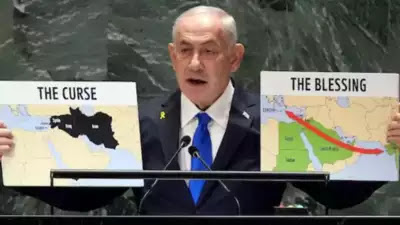Israeli PM Netanyahu Calls India a 'Blessing' and Iran a 'Curse' at UN, Presents Maps Showing Changes
During his speech at the United Nations General Assembly, Israeli Prime Minister Benjamin Netanyahu presented a series of maps and shared his views on the changing dynamics of the Middle East. He highlighted the progress Israel has made in establishing ties with other countries and emphasized the importance of building relationships for a more peaceful region.
Netanyahu pointed out that Israel is actively working towards making peace with more nations. He specifically talked about the ongoing talks with Saudi Arabia and other countries, mentioning how these efforts could bring significant changes to the Middle East. He used maps to show how the region has transformed over the years, with Israel becoming more integrated and accepted in different parts of the Arab world. This reflects a major shift from past decades when many countries did not recognize Israel.
While discussing the broader picture, Netanyahu called India a "blessing" for Israel, praising the strong relationship between the two countries. He noted how India and Israel have worked closely together in recent years, especially in fields like technology, agriculture, and defense. He stressed that India has been a positive partner, contributing to peace and development.
In contrast, Netanyahu described Iran as a "curse" and a significant threat not only to Israel but also to stability in the entire Middle East. He criticized Iran's leadership for its aggressive actions and for supporting groups that create unrest in the region. Netanyahu also spoke about the need for global cooperation to prevent Iran from obtaining nuclear weapons, as he believes that would pose a serious danger to many countries.
The Israeli Prime Minister made it clear that Israel is ready to expand its circle of peace, but he also emphasized that the country remains determined to defend itself against threats. He spoke about how Israel's partnerships with countries like the United States and India are crucial in facing challenges and promoting stability.
Netanyahu's speech at the UN highlighted both optimism and caution. On the one hand, he expressed hope for further peace agreements and improving relationships in the Middle East. On the other, he warned about the dangers posed by Iran and called for unity among nations to counter threats.
In summary, Netanyahu's address at the United Nations was a call for peace, partnership, and caution. He highlighted India as a valuable ally and labeled Iran as a danger to peace. The maps he presented showed the changes in the Middle East, reflecting both the progress made and the challenges that lie ahead.




Comments
Post a Comment